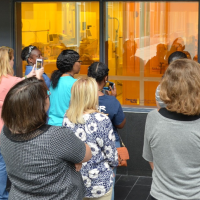5 min read
When looking for an environmentally friendly and cost-effective way to clean up contaminated water and soil, Georgia Tech researchers Patricia Stathatou and Christos Athanasiou turned to yeast. A cheap byproduct from fermentation processes — e.g., something your local brewery discards in mass quantities after making a batch of beer — yeast is…
5 min read
Georgia’s saltwater marshes — living where the land meets the ocean — stretch along the state’s entire 100-mile coastline. These rich ecosystems are largely dominated by just one plant: grass.Known as cordgrass, the plant is an ecosystem engineer, providing habitats for wildlife, naturally cleaning water as it moves from inland to the sea, and…
4 min read
Georgia Tech researcher Jie He set out to predict how rainfall will change as Earth’s atmosphere continues to heat up. In the process, he made some unexpected discoveries that might explain how greenhouse gas emissions will impact tropical oceans, affecting climate on a global scale.“This is not a story with just one punch line,” said He,…
4 min read
Biomedical engineer Annabelle Singer has spent the past decade developing a noninvasive therapy for Alzheimer’s disease that uses flickering lights and rhythmic tones to modulate brain waves. Now she has discovered that the technique, known as flicker, also could benefit patients with a host of other neurological disorders, from epilepsy…
2 min read
Growing the careers of research faculty at Georgia Tech is an integral part of Research Next, the strategic plan for the Institute’s research enterprise.Georgia Tech’s research faculty, who conduct vital research in labs, centers, and departments across campus, play a critical role in the research enterprise. To support these essential employees,…
8 min read
Semiconductors make our world run, but the industry faces a turning point. For decades, computer chip efficiency has doubled every two years, but that progress is slowing. To complicate the problem further, global demand for semiconductors threatens to outpace the supply. The U.S. has the opportunity to meet the growing need for chips — both by…
8 min read
When Amy Bonecutter-Leonard was a second-semester undergraduate at the Georgia Institute of Technology, she applied for a work-study job in the cleanroom at the Microelectronics Research Center (MiRC). There, she learned process techniques for making the same type of electronic chips used in cellphones. With this new knowledge, she…
3 min read
Quantum sensors detect the smallest of environmental changes — for example, an atom reacting to a magnetic field. As these sensors “read” the unique behaviors of subatomic particles, they also dramatically improve scientists’ ability to measure and detect changes in our wider environment.Monitoring these tiny changes results in a wide range of…
6 min read
To avoid catastrophic climate impacts, excessive carbon emissions must be addressed. At this point, cutting emissions isn’t enough. Direct air capture, a technology that pulls carbon dioxide out of ambient air, has great potential to help solve the problem.But there’s a big challenge. For direct air capture technology, every type of environment…
3 min read
The University System of Georgia Board of Regents has approved a new Neuroscience and Neurotechnology Ph.D. Program at Georgia Tech.The interdisciplinary degree is a joint effort across the Colleges of Sciences, Computing, and Engineering. The program expects to enroll its first graduate students in Fall 2025, pending approval by the Southern…














